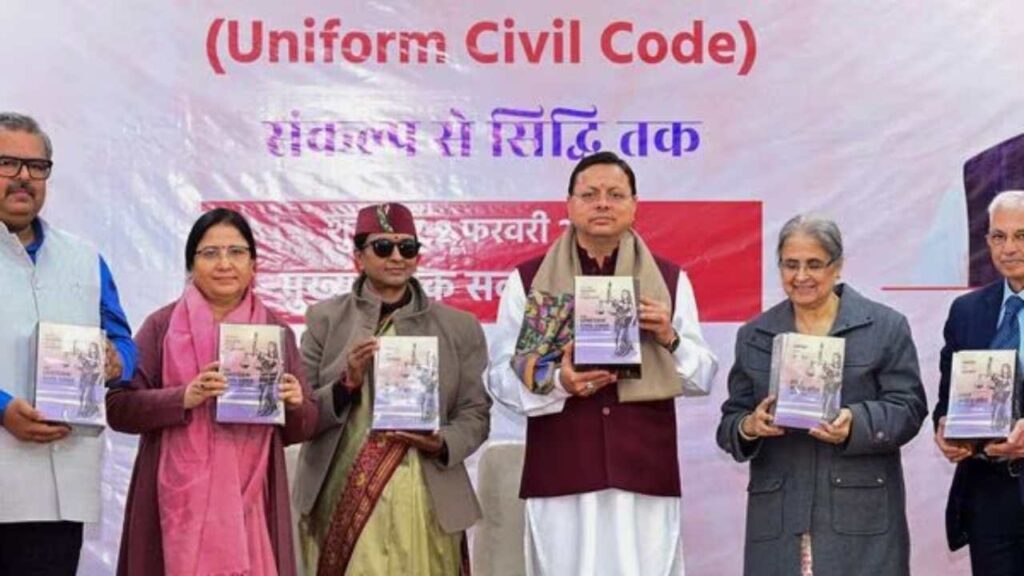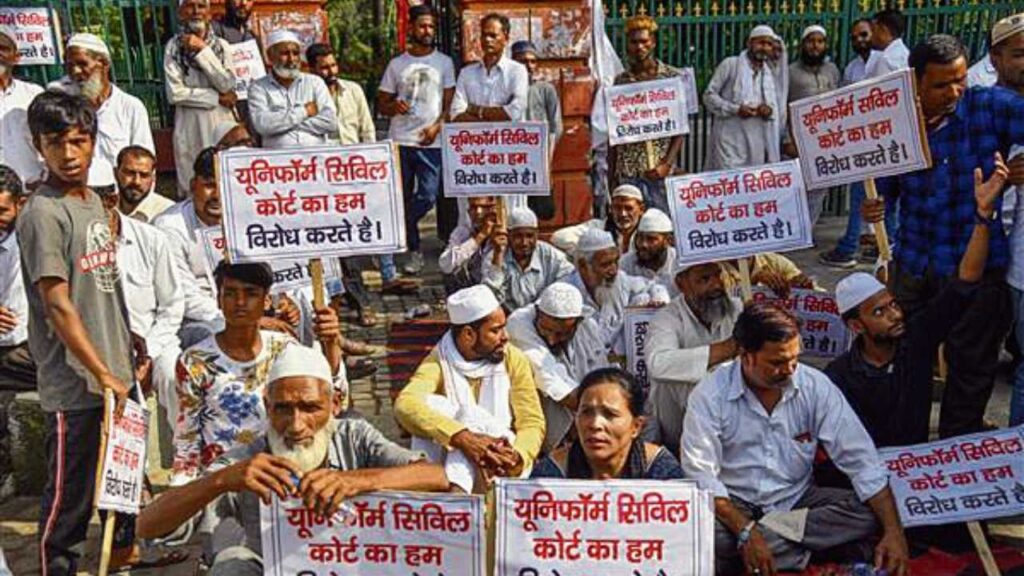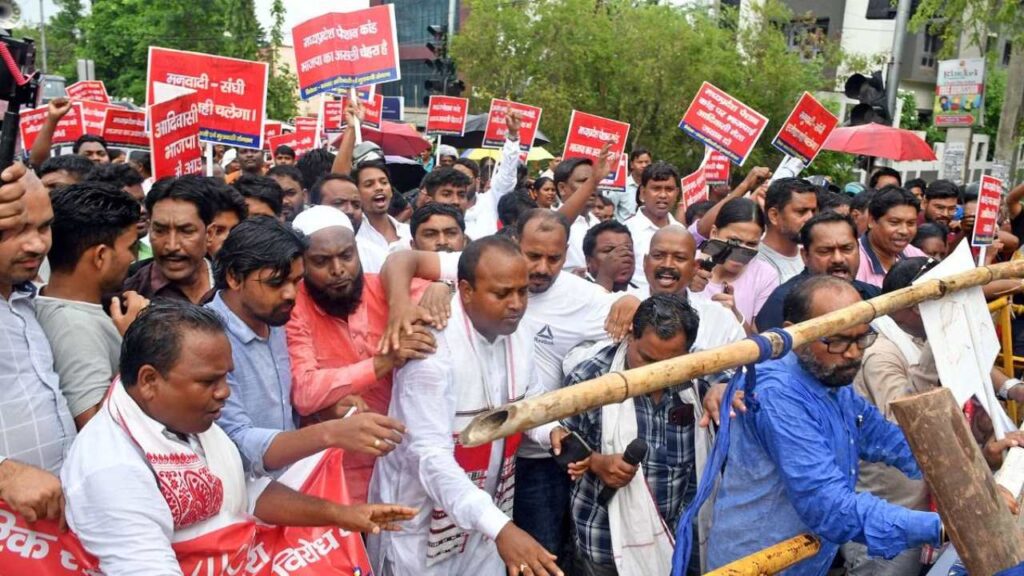In a landmark decision, the Uttarakhand cabinet has given the green light to the Uniform Civil Code (UCC) Bill, positioning the state to be the first in India to implement such comprehensive legislation. Chief Minister Pushkar Singh Dhami revealed the decision after a cabinet meeting on Sunday, paving the way for a special four-day assembly session set to begin on Monday to introduce the comprehensive civil code.
The Uttarakhand Assembly session begins on February 5, and the district government has enforced Section 144 within a 300-metre radius of the Assembly buildings.

The culmination of this historic move is the presentation of the final draft of the UCC, an extensive 740-page document across four volumes. The draft was delivered to Chief Minister Dhami by a distinguished five-member panel led by retired Supreme Court Justice Ranjana Prakash Desai.
Uttarakhand is poised to become the first state post-independence, after Goa, to adopt the Uniform Civil Code, operational since the time of Portuguese rule. The UCC’s application will extend to all religious communities in India, covering marriage, inheritance, divorce, adoption, maintenance, and other related matters.
The final report submitted by the five-member committee to Chief Minister Pushkar Singh Dhami recommends exempting tribal communities from the UCC’s purview. It emphasises women’s empowerment, advocating for measures like banning polygamy and establishing a uniform marriage age across religions. Additionally, the UCC is expected to regulate live-in relationships.
Once approved by the Uttarakhand Assembly, the UCC is shaped to become a model for other states, including Gujarat and Assam, to consider adopting.
Impact of UCC on Different Communities
The UCC’s implementation will significantly impact existing personal laws across various communities.
Hindu Community
Existing laws like the Hindu Marriage Act (1955) and the Hindu Succession Act (1956) would be dissolved and incorporated into the UCC. This would lead to standardisation and uniformity in marriage, divorce, inheritance, and succession laws for Hindus.
Under the Hindu Succession Act (1956), the husband’s family is considered the rightful heirs of the dead wife, and her parents and siblings are considered secondary. The Act also makes a distinction between ancestral and acquired property. Under UCC, who is considered a legal heir and how property is acquired under the Act will change. In Hindu law, full-blood relations are preferred over half-blood ties under Section 18 of the Hindu Succession Act. It also enlists people who cannot inherit the property on different grounds. This will change with the implementation of the UCC.
Muslim Community
Practices such as contract marriage (mutah), Nikah halala, misyar marriage, and polygamy would likely become ineffective. A Muslim cannot currently adopt a child, but he can become a ‘Kafil’ and care for the child’s upkeep and well-being even though he is not a biological father.

Currently, a Muslim man can marry four women at once, but his female counterparts cannot. However, the UCC will abolish polygamy, removing the Muslim man’s legal ability to marry four separate women. The UCC is even changing the minimum marriage age under Sharia law.
Christian Community
The UCC will bring uniformity to Christian marriages, including rules and procedures for divorce and inheritance. While the Catholic law does not recognise divorce, Christians have the choice to file divorce under the Indian Divorce Act. The UCC, which aims to bring uniformity in rules and procedures for divorce, leaves the community with no second choice.
Sikh Community
The Anand Marriage Act of 1909 governing Sikh marriages will likely see changes, including the introduction of a common law for divorce, which is mentioned in the Act.
Parsi Community
The UCC would impact adoption laws within the Parsi community, addressing disparities in inheritance rights for adopted children. If a Parsi woman marries outside her community, her children do not hold the right to inherit the property of a deceased Parsi intestate. This rule would change under the UCC.
What is the reaction so far?
Uttarakhand Chief Minister Pushkar Singh Dhami has said the proposed Uniform Civil Code (UCC) in the hill state was not aimed at appeasing any section or targeting a community and asserted its implementation would empower all sections of society.
The UCC’s approval has garnered mixed reactions from various political and social circles. Supporters like Pooja Nanda, a BJP supporter and political activist, lauded the UCC as a positive development for women, emphasising its potential to eliminate discriminatory laws and practices. However, sceptics aligned with Congress’s ideology raised concerns about the UCC’s potential to sow division among religious communities.
As ANI reported, Sajid Rashidi, a Muslim clerk, speculated on how the UCC would affect the laws of different religions and hurt religious sentiments. He appealed to all the communities to get together to conduct protests against the laws on religion by the UCC.
Last year, Mohammad Ismail, a member from Madras, was among the first to oppose a Uniform Civil Code (UCC) in the Constituent Assembly. In a group of five Muslim members, including Naziruddin Ahmed and Mehboob Ali Baig, he proposed an amendment against the UCC. Urdu poet Maulana Hasrat Mohani also joined the debate against it. The discussions reflected the hopes and fears of the time, emphasising religious and cultural autonomy, opposing potential violations of fundamental rights, questioning the complexity and practicality, and expressing concerns about social unrest. Critics highlighted the importance of preserving diversity and pluralism through the retention of personal laws.
Tribals are exempted: Why?
The proposed legislation, scheduled for introduction in the state assembly next week, is poised to fully exempt the tribal population of Uttarakhand from its provisions.
Scheduled tribes, constituting approximately 2.9% of the state’s population, will be excluded from the Uttarakhand UCC. The tribes, including Jaunsari, Bhotiyas, Tharu, Raji, and Buksa, have historically practiced unique customs such as polyandry and polygamy, which, while less common today, persist within their communities.

This move is politically significant, especially with the upcoming Lok Sabha elections, as tribal populations constitute a crucial voting bloc in several states. The exemption aligns with the assurance from Union ministers and the Chairperson of the parliamentary panel on law and justice, Sushil Modi, that the UCC would not interfere with tribal customs.
The significance extends beyond Uttarakhand, as the state’s UCC is expected to serve as a model for similar legislation in Assam and Gujarat, both of which have substantial tribal populations. Assam’s Chief Minister has already indicated that their UCC, modelled after Uttarakhand’s, will also exclude tribal groups.









